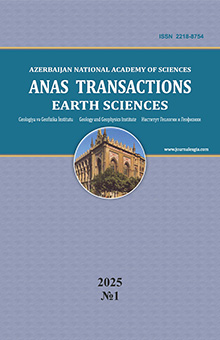№ 1,
2022
Download the article
Impact of microwave radiation on the separation of oil-water emulsion
M.F.Nagiyev Institute of catalysis and inorganic chemistry, National Academy of Sciences of Azerbaijan
113 G. Javid Ave., Baku, Azerbaijan, AZ1143: muradovaperi@rambler.ru
Summary
A-
A+
The flooding of productive layers of oil fields causes serious complications in the oil production, collection and treatment associated with the formation of water-oil emulsions. This is particularly evident in the case of highly viscous oil fields at a late stage of development. Based on our previous results of the impact of microwave radiation on the rheological and physicochemical properties of samples of high-viscosity oil demulsified by the traditional thermal method from the Balakhani-Sabunchu-Ramany and Kyurovdag fields of Azerbaijan, this paper presents the results of a study of the effect of microwave radiation (2450 MHz) on aggregative stability and the destruction of the hydrophobic (reverse) water-oil emulsion of samples of crude oil of the mentioned fields. It was demonstrated, that under conditions of traditional thermal treatment of emulsion samples, containing various amounts of natural emulsifiers (resins + asphaltenes), the rate of water separation is almost constant, while under microwave exposure, the difference in the rate of separation of the water phase in oil from the Kurovdag field with a relatively high content of resins and asphaltenes is much higher than of oil from the Balakhani-Sabunchu-Ramany field. There was an established fact of the non-thermal effect of microwave action on the water-oil emulsion, which was its main advantage and difference from the common methods of traditional thermal and reagent separation of the emulsion, both in terms of reducing energy costs and eliminating the use of expensive emulsifiers.
Keywords: high-viscosity oil, thermolysis, microwave radiation, non-thermal effect, water-oil emulsion
REFERENCES
Antipin Yu.V., Valeev M.D., Syrtlanov A.Sh. Prevention of complications in the production of flooded oil. Bashk. book publishing house. Ufa, 1987, 168 p. (in Russian).
Berdonosov S.S., Berdonosova D.G., Znamenskaya I.V. Microwave radiation in chemical practice. Chem. technology, No. 3, 2000, p. 2-8 (in Russian).
Gumovsky O.A., Sakhabutdinov R.Z., Kosmacheva T.F. Patent of the Russian Federation 2356596. Device for the destruction of water-oil emulsion during pipeline transportation.
Appl. 2008105505/15, 2008.02.12 (in Russian).
Kovaleva L.A., Minnigalimov R.Z., Zinnatullin R.R. On the study of dielectric and rheological characteristics of oilwater emulsions. High temperature thermophysics, Vol. 46, No. 5, 2008, 795 p. (in Russian).
Kovaleva L.A., Zinnatulin R.R. Investigation of the stability of an oil-water emulsion in an electromagnetic field depending on its dielectric properties. Oil and Gas, No. 2, 2010, pp. 59-
62 (in Russian).
Valitov R.A., Dyubko S.F., Makarenko B.I. et al. (ed.). Measurements on millimeter and submillimeter waves Radio and communication. Moscow, 1984, 296 p. (in Russian).
Mir-Babaev M.F. Brief history of Azerbaijani oil. Azerneshr. Baku, 2009, 376 p. (in Russian).
Muradova P.A., Strekov A.S., Litvishkov Yu.N. Effect of microwave radiation on the rheology of high-viscosity oil. Avtogazozapravochnyj kompleks plius al'ternativnoe toplivo (Autogas complex + alternative fuel), No. 10, 2014, pp.7-11 (in Russian).
Muradova P.A., Zulfugarova S.M., Gasankulieva N.M., Shakunova N.V., Tretyakov V.F., Talyshinsky R.M.,
Litvishkov Yu.N. et al. On the effect of microwave activation of water on the dealkylation of toluene with water vapor in the presence of a Ni-Co-Cr/Al/Al2O3 catalyst. Oil and gas chemistry, No. 3, 2016, p. 23-26 (in Russian).
Muradova P.A., Zulfugarova S.M., Graser E., Strekov A.S., Litvishkov Y.N. Microwave-induced thermolysis of petroleum under the action of heterogeneous catalysts. Chemie Inhalt Ingenieur
Technik, Vol. 90, No. 3, 2018, pp. 1-6 (in German).
Rakhmankulov D.L., Bikbulatov I.Kh., Shulaev N.S., Shavshukova S.Yu. Microwave radiation and intensification of chemical pro-cesses. Chemistry. Moscow, 2003, 220 p. (in Russian).
Zinnatullin P.P., Fatkhullina Yu.I. Dehydration of highly stable water-oil emulsions by electromagnetic fields of high-frequency and ultra-high-frequency ranges. Oil and Gas Technologies, No. 1(78), Moscow, 2012, pp. 24-29 (in Russian).
DOI:
10.33677/ggianas20220100076
Keywords: high-viscosity oil, thermolysis, microwave radiation, non-thermal effect, water-oil emulsion
REFERENCES
Antipin Yu.V., Valeev M.D., Syrtlanov A.Sh. Prevention of complications in the production of flooded oil. Bashk. book publishing house. Ufa, 1987, 168 p. (in Russian).
Berdonosov S.S., Berdonosova D.G., Znamenskaya I.V. Microwave radiation in chemical practice. Chem. technology, No. 3, 2000, p. 2-8 (in Russian).
Gumovsky O.A., Sakhabutdinov R.Z., Kosmacheva T.F. Patent of the Russian Federation 2356596. Device for the destruction of water-oil emulsion during pipeline transportation.
Appl. 2008105505/15, 2008.02.12 (in Russian).
Kovaleva L.A., Minnigalimov R.Z., Zinnatullin R.R. On the study of dielectric and rheological characteristics of oilwater emulsions. High temperature thermophysics, Vol. 46, No. 5, 2008, 795 p. (in Russian).
Kovaleva L.A., Zinnatulin R.R. Investigation of the stability of an oil-water emulsion in an electromagnetic field depending on its dielectric properties. Oil and Gas, No. 2, 2010, pp. 59-
62 (in Russian).
Valitov R.A., Dyubko S.F., Makarenko B.I. et al. (ed.). Measurements on millimeter and submillimeter waves Radio and communication. Moscow, 1984, 296 p. (in Russian).
Mir-Babaev M.F. Brief history of Azerbaijani oil. Azerneshr. Baku, 2009, 376 p. (in Russian).
Muradova P.A., Strekov A.S., Litvishkov Yu.N. Effect of microwave radiation on the rheology of high-viscosity oil. Avtogazozapravochnyj kompleks plius al'ternativnoe toplivo (Autogas complex + alternative fuel), No. 10, 2014, pp.7-11 (in Russian).
Muradova P.A., Zulfugarova S.M., Gasankulieva N.M., Shakunova N.V., Tretyakov V.F., Talyshinsky R.M.,
Litvishkov Yu.N. et al. On the effect of microwave activation of water on the dealkylation of toluene with water vapor in the presence of a Ni-Co-Cr/Al/Al2O3 catalyst. Oil and gas chemistry, No. 3, 2016, p. 23-26 (in Russian).
Muradova P.A., Zulfugarova S.M., Graser E., Strekov A.S., Litvishkov Y.N. Microwave-induced thermolysis of petroleum under the action of heterogeneous catalysts. Chemie Inhalt Ingenieur
Technik, Vol. 90, No. 3, 2018, pp. 1-6 (in German).
Rakhmankulov D.L., Bikbulatov I.Kh., Shulaev N.S., Shavshukova S.Yu. Microwave radiation and intensification of chemical pro-cesses. Chemistry. Moscow, 2003, 220 p. (in Russian).
Zinnatullin P.P., Fatkhullina Yu.I. Dehydration of highly stable water-oil emulsions by electromagnetic fields of high-frequency and ultra-high-frequency ranges. Oil and Gas Technologies, No. 1(78), Moscow, 2012, pp. 24-29 (in Russian).
